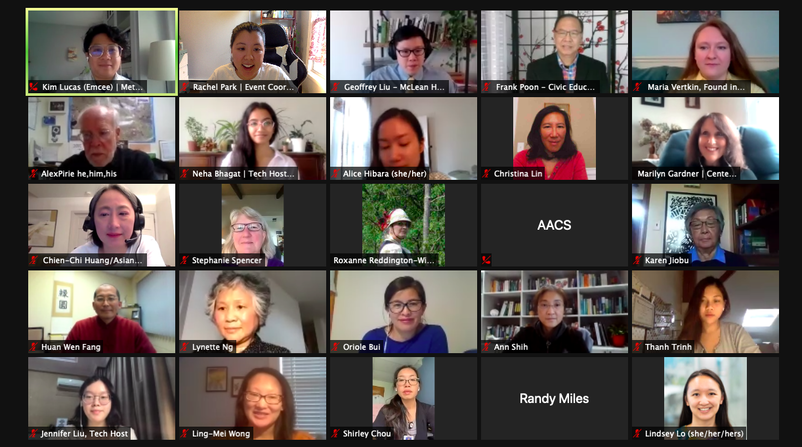|
The 8th annual State of Asian Women’s Health Conference was held virtually on November 12, 2020, and this year’s theme was “Trust in the Time of COVID: Best Practices for Culturally Responsive Care & Support”. Almost 100 community members, from students to health professionals, registered for our first virtual conference! Conference objectives included:
To get involved in next year’s annual conference, please email [email protected]. Some overarching notes from the morning & afternoon sessions below: morning sessionsAswita Tan-McGrory (Director, Disparities Solutions Center, Massachusetts General Hospital) kicked off the conference with a powerful keynote. Aswita encouraged discussion on how race and language can impact the quality of care. The audience learned about racial disparities in health, e.g. infant mortality rate. The session ended on an actionable note -- how can we acknowledge differences & barriers, and consequently, create space for a more tailored approach with culturally responsive care? The panel discussion, moderated by Marilyn Gardner, revolved around patient advocacy and how to engage patients with cultural humility. Panelists included Lynette Chen (Medical Interpreter and Cancer Survivor); Maria Vertkin (Founder & Executive Director, Found in Translation); Geoffrey Liu (Assistant Psychiatrist, Behavioral Health Partial Hospital Program); and Frank Poon (President, Civic Education Alliance). Language is a big barrier in culturally responsive care, and Marilyn shared this powerful patient quote: "The doctors want my symptoms, but they don't want my stories" The morning sessions wrapped up with a wellness activity: “Boost your immunity with T-cells activation exercise” with Jonathan Fang (Practitioner, In Hand Acupuncture and Herbs). afternoon sessionsAttendees were able to select from 3 workshops on a variety of topics: CLAS – A Program Management Quality Improvement (PMQI) Tool to Advance Equitable Culturally and Responsive Care for Asian Women in Massachusetts
Communicating Across Boundaries - Overview of a time-tested Cultural Competency Curriculum for Health and Human Service Providers
Hepatitis B Education, Screening and Linkage to Care before and during the COVID-19 Pandemic
The conference wrapped up with an engaging plenary discussion, led by Jonathan Jackson (Executive Director of CARE Research Center, MGH). Jonathan facilitated a whiteboard session, crowdsourcing notes on the 3 biggest barriers preventing marginalized groups from participating equitably in clinical trials. Attendees grouped all of the barriers into themes and came up with the following:
We are so grateful for the generous support of our sponsors: South Cove Community Health Center, CHAAO, the Disparities Solutions Center, Eastern Bank, and Harvard T.H. Chan School of Public Health. We are also proud to have had Action for Boston Community Development (ABCD), Color Magazine, Z-Park, and Dana Farber Cancer Institute as conference partners! Thank you to Thanh Trinh, Ling-Mei Wong, and Jenny Yuan for their contributions to this post! Written by: Rachel Park
3 Comments
3/28/2023 08:42:27 am
Amazing information providing by your article, thank you so much for taking the time to share a wonderful article.
Reply
Addressing health disparities in research, as discussed in the Sian Women's Health Conference, is of paramount importance. Equally significant is the integration of digital hospital cards, streamlining healthcare access and enhancing patient care. These cards provide a convenient and efficient way to bridge gaps in healthcare delivery, ensuring that women, especially, receive the quality medical attention they deserve.
Reply
11/7/2023 09:54:03 pm
I really enjoyed reading your blog post . It was very informative and well-written. I especially appreciated your insights. you may also visit my website at https://chikaminute.com/polycystic-ovary-syndrome-pcos/
Reply
Leave a Reply. |
Archives
July 2024
Categories |
|
© Asian Women for Health. All rights reserved.
|
WHAT WE DODONATEcontact us |


 RSS Feed
RSS Feed